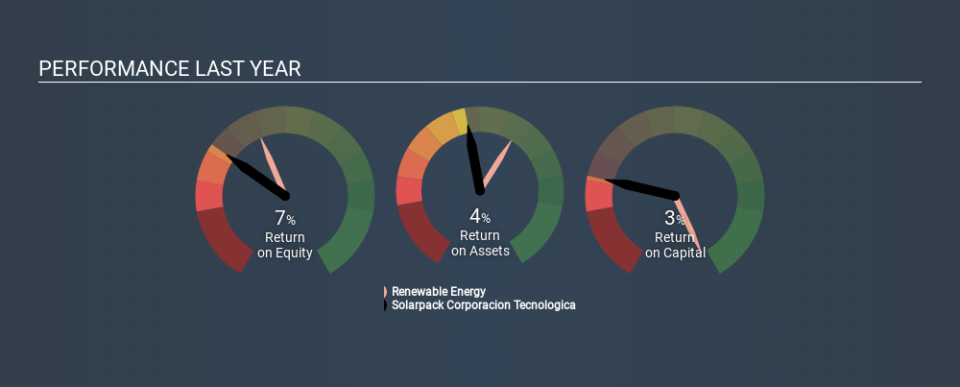Is Solarpack Corporacion Tecnologica, S.A.'s (BME:SPK) ROE Of 7.2% Concerning?

Many investors are still learning about the various metrics that can be useful when analysing a stock. This article is for those who would like to learn about Return On Equity (ROE). We'll use ROE to examine Solarpack Corporacion Tecnologica, S.A. (BME:SPK), by way of a worked example.
Solarpack Corporacion Tecnologica has a ROE of 7.2%, based on the last twelve months. One way to conceptualize this, is that for each €1 of shareholders' equity it has, the company made €0.07 in profit.
See our latest analysis for Solarpack Corporacion Tecnologica
How Do You Calculate Return On Equity?
The formula for return on equity is:
Return on Equity = Net Profit (from continuing operations) ÷ Shareholders' Equity
Or for Solarpack Corporacion Tecnologica:
7.2% = €12m ÷ €166m (Based on the trailing twelve months to December 2019.)
It's easy to understand the 'net profit' part of that equation, but 'shareholders' equity' requires further explanation. It is the capital paid in by shareholders, plus any retained earnings. The easiest way to calculate shareholders' equity is to subtract the company's total liabilities from the total assets.
What Does Return On Equity Mean?
ROE measures a company's profitability against the profit it retains, and any outside investments. The 'return' is the yearly profit. A higher profit will lead to a higher ROE. So, as a general rule, a high ROE is a good thing. That means ROE can be used to compare two businesses.
Does Solarpack Corporacion Tecnologica Have A Good ROE?
One simple way to determine if a company has a good return on equity is to compare it to the average for its industry. However, this method is only useful as a rough check, because companies do differ quite a bit within the same industry classification. If you look at the image below, you can see Solarpack Corporacion Tecnologica has a lower ROE than the average (12%) in the Renewable Energy industry classification.
That certainly isn't ideal. We prefer it when the ROE of a company is above the industry average, but it's not the be-all and end-all if it is lower. Nonetheless, it might be wise to check if insiders have been selling.
How Does Debt Impact Return On Equity?
Most companies need money -- from somewhere -- to grow their profits. That cash can come from retained earnings, issuing new shares (equity), or debt. In the first two cases, the ROE will capture this use of capital to grow. In the latter case, the debt used for growth will improve returns, but won't affect the total equity. Thus the use of debt can improve ROE, albeit along with extra risk in the case of stormy weather, metaphorically speaking.
Solarpack Corporacion Tecnologica's Debt And Its 7.2% ROE
Solarpack Corporacion Tecnologica does use a significant amount of debt to increase returns. It has a debt to equity ratio of 2.68. The company doesn't have a bad ROE, but it is less than ideal tht it has had to use debt to achieve its returns. Debt does bring extra risk, so it's only really worthwhile when a company generates some decent returns from it.
The Key Takeaway
Return on equity is useful for comparing the quality of different businesses. In my book the highest quality companies have high return on equity, despite low debt. If two companies have around the same level of debt to equity, and one has a higher ROE, I'd generally prefer the one with higher ROE.
But when a business is high quality, the market often bids it up to a price that reflects this. It is important to consider other factors, such as future profit growth -- and how much investment is required going forward. So I think it may be worth checking this free report on analyst forecasts for the company.
If you would prefer check out another company -- one with potentially superior financials -- then do not miss this free list of interesting companies, that have HIGH return on equity and low debt.
If you spot an error that warrants correction, please contact the editor at editorial-team@simplywallst.com. This article by Simply Wall St is general in nature. It does not constitute a recommendation to buy or sell any stock, and does not take account of your objectives, or your financial situation. Simply Wall St has no position in the stocks mentioned.
We aim to bring you long-term focused research analysis driven by fundamental data. Note that our analysis may not factor in the latest price-sensitive company announcements or qualitative material. Thank you for reading.

 Yahoo News
Yahoo News 

